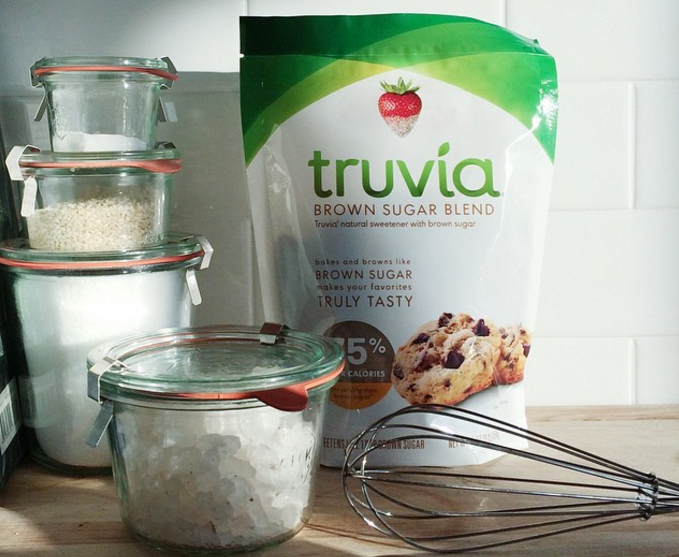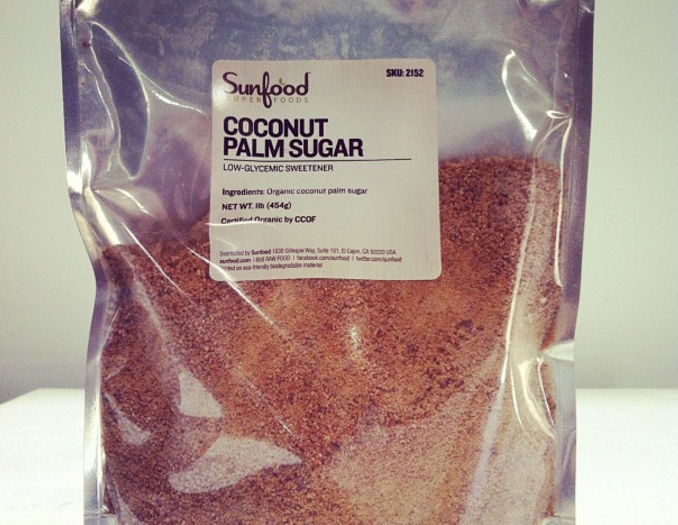Spoiler alert: sugar is bad news. Thanks to its addictive nature, however, quitting cold turkey is excruciatingly painful. Enter sugar substitutes.
While some are natural and low in calories, the debate is still heated about whether or not they’re good for you. But since baked goods usually require a bit of sweetness, using a sugar substitute (like Truvia or coconut sugar) is not a bad idea.
But don’t be fooled: it may taste sweet, but it’s still crucial to know what you’re getting into.
Truvia

Photo courtesy of @truvia on Instagram
Truvia is made from the extract of the stevia plant and erythritol (a natural sugar alcohol). It’s a zero-calorie sweetener that comes in three varieties – Truvia Natural Sweetener, Truvia Baking Blend, and Truvia Brown Sugar Blend. By choosing the baking blend over generic sugar, you can reduce the calories in your baked goods by 75 percent.
Yes, Truvia is less likely to spike your blood sugar levels than regular sugar, but the ingredient list is a bit misleading. Be careful with conversions when using Truvia in a recipe since it’s not an exact 1:1 ratio. Thankfully, there’s a nifty little table on their website. If you’re ready to get baking, check out these Truvia-safe recipes.
Coconut Sugar

Photo courtesy of @sunfood on Instagram
Coconut sugar is made from the sap of the flower buds on a coconut palm, and no, it will not add a coconut flavor to your cake or cookie. Actually, the taste is reminiscent of brown sugar and works well in its place.
It’s packed with B vitamins and has a high mineral content (think potassium, magnesium, zinc and iron). It also scores a low 35 on the glycemic index – a scale that ranks foods based on their effects on blood sugar levels. A 35 is a great score, and it’s even lower than agave syrup.
The negative of the glycemic index system? It only measures glucose. That’s the stuff that your body turns starches into. So, even though coconut sugar has a low amount of glucose, 39% of the substitute is fructose. Fructose is a natural sugar found in fruit, but too much of this good thing is a bad thing. High amounts of it can create a toxic load on your liver.
Since coconut sugar is dark in color and coarse, it might give your batter a few freckles. If you’re using any liquids or semi-liquids, let the sugar dissolve in those for a few minutes before continuing with the recipe.
No need to stress over conversions – just stick to a 1:1 ratio. Take this sugar impersonator out for a spin with one of these recipes.
The Winner’s Circle
Artificial sweeteners are pretty much officially on the naughty list. Incorporating any sort of added sugar into your diet can’t be beneficial. Study after study has linked the tasty devil to higher risks of heart disease and other health concerns. If you need something sweet, you just have to pick your poison.
Between Truvia and coconut sugar, the latter is half as painful on the wallet. If you’re shopping at Walmart, Truvia is 61¢ per oz while coconut sugar is only 28¢ per oz. Yes, regular sugar is about 6¢ per oz, but good health is priceless.
If your goal is to consume the fewest calories possible, Truvia is your new best friend. However, if you want some extra nutrients and are looking for a toasty baking flavor, hit up that coconut sugar. If neither suit your style, there’s always the classic, artery-clogging, refined sugar.


